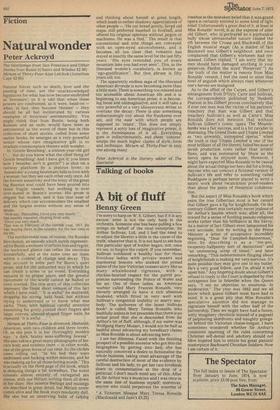Fiction
Natural wonder
Peter Ackroyd
The Gentleman from San Francisco and Other Stories Ivan Bunin (Chatto and Windus E2.50) Miriam at Thirty-Four Alan Lelchuk (Jonathan Cape £2.95) Natural forces such as death, love and the passing of time, are the unacknowledged legislators for what has now become enshrined as 'literature': so it is odd that when these powers are confronted, as it were, head-on — when, in fact, they become 'themes' — they should be all but incinerated by various examples of ferocious sentimentality. You might think that Ivan Bunin, being both Russian and an exile, would have been as sentimental as the worst of them but in this collection of short stories, culled from some earlier books, he emerges as a very powerful writer whose rare imaginative gift is to irradiate commonplace themes with wonder.
In 'Gentle Breathing', a sixteen-year-old girl ("... but do you know what the chief thing is? Gentle breathing! And I have got it; you listen how I breathe; isn't it gentle?") is shot on a railway platform by a jealous lover; in 'Sunstroke' a young lieutenant falls in love with a woman, but they see each other only once. All the fervent sensitivity and the irony of the great big Russian soul could have been poured into these fragile vessels, but nothing is ever over-stated in Bunin's stories. His prose is elegant but modest, and it has that ease of delivery which can accommodate the smallest and the largest events without any sense of strain:
-Now say: 'Petrushka, I love you very much.'"
She numbly repeated, choking from sobs: "1 love you very much..
That That was in Februay of the terrible year, 1917. He was staying there in the country for the last time in his life.
The terrible event was, of course, the Russian Revolution, an episode which surely represented for Bunin a moment of infinite loss and regret; the backward glance can refine the emotions wonderfully, and at the same time set them within a context of change and decay. This may account in some part for Bunin's quiet prose, and for the unhurried way in which he can create a scene or an event. Everything remains in its proper place, and the general movement of the world cannot be halted or even averted. The title story of this collection represent the finest short version of this fact which I have read: 'It is awful!' he muttered, dropping his strong, bald head, but without trying to understand or to know what was awful. Then, with habitual careful attention examining his gouty-jointed short fingers and large, convex, almond-shaped finger nails, he repeated: 'It is awful ...' ".
Miriam at Thirty-Four is divorced, liberated, American, with two children and three lovers. Or, as she puts it in her thoroughly modern way: -a dark, brainy semi-suffering Jewess". She also takes a great many photographs of her own body and exhibits them — in other words, one of the great bores of our time. So the cliches come rolling out: "In his bed they were undressed and fucking within minutes, and he was making up for all those boring words." This is actually on the third page of the book, which is delaying things a bit nowadays. The novel consists almost entirely of variegated sex scenes, with our Miriam writing them all down in her diary. Her interior feelings and musings are described in great detail, but Miriam never comes alive and the book stays resolutely dull. She also has an unnerving habit of talking and thinking about herself at great length, which leads to rather shadowy appreciations of other people — "He cut bread gently, lovgd old maps, still preferred baseball to football, and offered his original opinions without jargon or machismo. He was a find." The result is that conventional and trite things are conveyed with an open-eyed astonishment, and it becomes all too clear that romance has stayed at exactly the same level for the last fifty years: "His eyes reminded you of every mountain lake you had ever seen". This, in the liberated women's vocabulary, is known as -ego-gratification". But that phrase is fifty years old, too.
The apparently endless saga of the liberated American divorcée is now becoming more than a little stale. There is something too relaxed and too accessible about American life and it is beginning to sap American prose: it is becoming loose and unimaginative, and it will take a very powerful or a very idiosyncratic writer to overtake the decay. There is also something embarrassingly coy about the frankness over sex, and the ease with which people are supposed to 'relate'. This does not simply represent a sorry loss of imaginative power; it is the formlessness of it all. Everything goes in indiscriminately, and sheer 'content' usurps the much higher claims of style, form and technique. Miriam at Thirty-Four is only one among many.
Peter Ackroyd is the literary editor of The Spectator


































 Previous page
Previous page